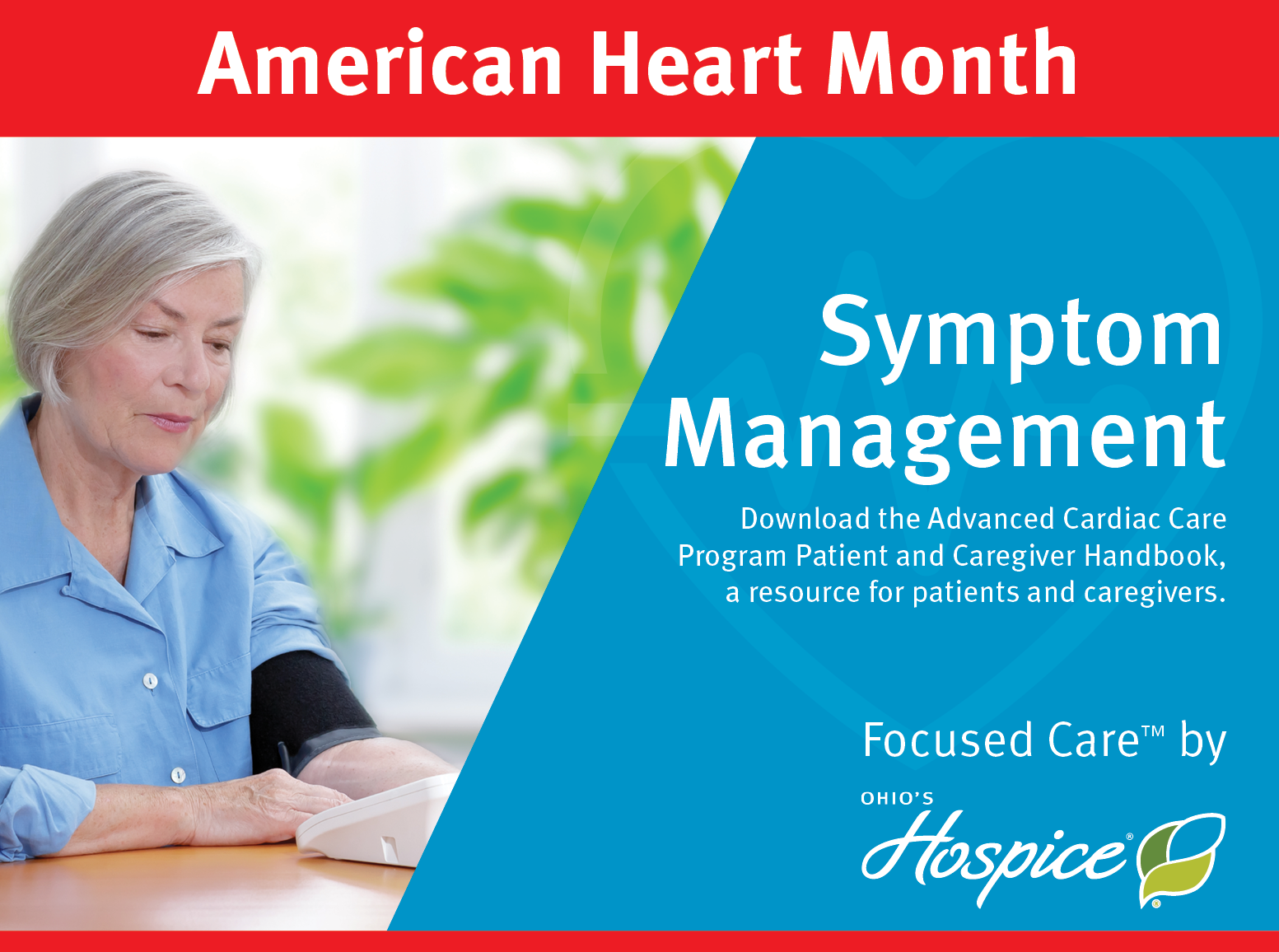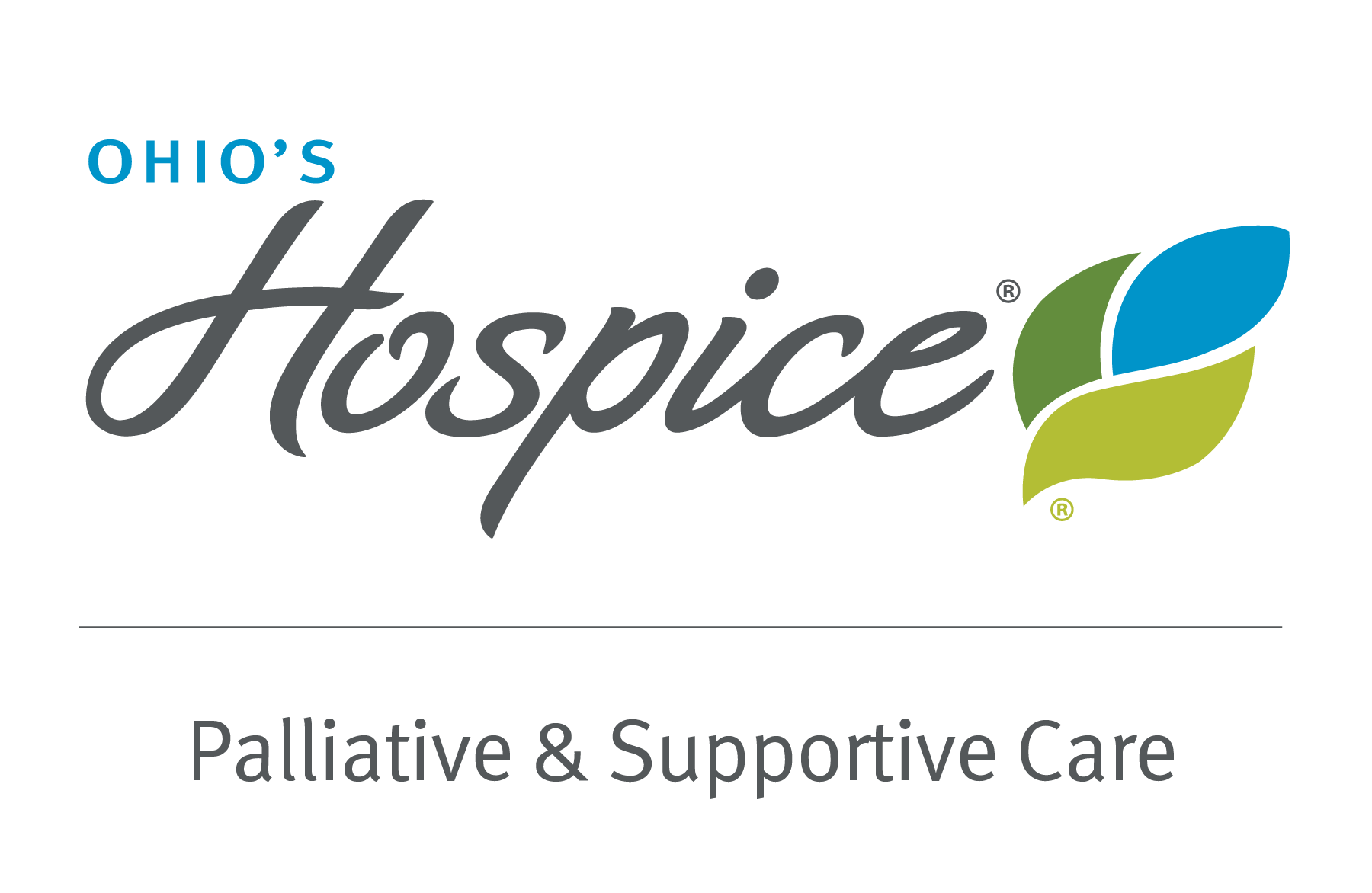
American Heart Month: Managing Symptoms of Advanced Cardiac Disease
During the month of February, Ohio’s Hospice is observing American Heart Month. As part of its Focused Care™ program, Ohio’s Hospice helps patients manage the symptoms of advanced cardiac disease through symptom management, medications and diet.
Through its Focused Care program, Ohio’s Hospice offers the Advanced Cardiac Care program to patients throughout the state of Ohio. The Advanced Cardiac Care program is a resource that is available through collaboration with the American Heart Association (AHA) and the National Partnership for Healthcare and Hospice Innovation (NPHI).
The program’s patient and caregiver guide help avert multiple hospital and emergency room visits that are a huge source of stress for the patient and their family members. Through its affiliates, Ohio’s Hospice is launching the program throughout the state of Ohio.
Focused CareTM
Lynda Weide, MSN, RN, CHPN, is the director of Focused Care™ at Ohio’s Hospice. She is instrumental in leading the Ohio’s Hospice Focused Care program, a disease-specific program that customizes each patient’s care. Focused Care services include symptom management for patients with cancer, heart disease and pulmonary illnesses, including Respiratory Therapy support.
The Focused Care team helps patients with heart disease through symptom management. Team members monitor a patient’s vital signs, weight, fluid status, and activity tolerance. Symptom management enables the care team to make necessary changes to the patient’s regimen or medications to help avoid heart failure exacerbations.
“Through expert symptom management and a proactive approach, we can help our patients avoid any unnecessary hospitalizations,” Weide said. “This will allow the patient to stay where they want to be.”
The Focused Care Team customizes the plan of care for each patient. Weide explained that every patient has their own baseline. The team works with each patient to determine their baseline weight and vital signs.
“That baseline is a gauge to the patient’s tolerance to medications and therapies,” Weide said. “It also is important to customize a patient’s goals of care. A patient’s tolerance and their goals of care should both be considered when making decisions about the patient’s treatment and plan of care.”
Education specifically designed for the patient and the patient’s family is part of the Advanced Cardiac Care program that Ohio’s Hospice offers. Patients and their families learn about how the heart works, heart failure, common symptoms of heart failure, and self-care techniques to reduce symptoms.
Heart Failure
Heart failure is a condition in which the heart is not pumping blood throughout the body as well it should. While heart failure may shorten a patient’s life, good medical management can help a patient live longer with a better quality of life.
Common symptoms of heart failure include:
- Shortness of breath
- A persistent, dry cough
- Weight gain
- Edema (swelling in the legs, ankles and occasionally the abdomen due to a build-up of fluid)
- Fatigue
- Loss of appetite and nausea
- Chest pain
Symptom Management
Many of these symptoms can be managed or controlled with medications and self-care techniques in the comfort of a patient’s home.
- Shortness of breath can be reduced by elevating the patient’s head and shoulders with several pillows or sitting upright, turning on a fan, and using oxygen.
- Chest pain can be managed through medication.
- Edema or swelling occurs when fluid is retained. It can be managed with diuretics or water pills, elevating extremities or using compression hose, if recommended by your provider. Good nutrition and the reduction of salty foods and fluids can help reduce edema in the body.
- Anxiety and restlessness can be managed through calming breaths, relaxation or meditation, or an easy walk for a few minutes.
- Wear loose clothing so that the blood flow is not restricted.
- Avoid others with colds. A cold or the flu can place extra demand on the heart and lungs.
- Reduce dust and humidity in a patient’s living area. This will help with breathing.
- Getting exercise, such as walking, can help a patient feel stronger, for those who are able. Sleep is important. Regular physical activity, limiting alcohol, avoiding caffeine, and developing a pre-bedtime routine can help those with heart disease get better rest.
- For those who have sleep apnea, managing this condition can help lower blood pressure and reduce stress on the heart.
“We are offering the Advanced Cardiac Care program to address the disease-specific symptoms of patients with heart disease,” Weide said. “Our goal is to improve the quality of life and help our patients avoid unnecessary hospitalizations and emergency room visits.”
Medications
Taking medications every day is necessary for patients to manage their heart disease.
“It is important that they take their medications as prescribed by their medical provider to help control their symptoms,” Weide said. “If medications are not taken consistently, they could cause unwanted problems for the patient.”
The Advanced Cardiac Care program’s patient and caregiver guide includes a section on medications. The section lists several common medications and explains their purpose with heart disease to encourage patients to take their medications every day.
She explained that various medications help with heart disease. Here are a few examples:
- Angiotensin converting enzyme inhibitors (ACE) work to increase the flow of blood. They lower blood pressure and reduce the amount of work the heart must do.
- An antiplatelet medication works to prevent platelets from clumping together to form a clot.
- Beta blockers work to lower blood pressure and control the heart rate.
- Diuretics, commonly known as “water pills,” help rid the body of excess fluid, which makes it easier for those with heart disease to breathe.
- Nitrates cause blood vessels to dilate, allowing more blood to flow to the heart.
“When we provide education to the patient and their families about their medication, that understanding helps improve consistency in taking medications,” Weide said. “Most of our heart disease patients take more than one medication to manage their symptoms.”
Patients should not stop taking their medications or change their dosage unless they have been instructed to do so by their nurse, physician or medical provider.
“They could cause themselves to have a more miserable experience by prematurely stopping their heart disease medications,” she said. “Our Focused Care team educates our patients, so they have a clear understanding of what their medications do and how they help manage their symptoms.”
Diet
The Advanced Cardiac Care program’s patient and caregiver guide also includes a section on diet. Weide and the Focused Care Team encourage their patients with heart disease to make a few dietary changes to make them feel more comfortable and improve their quality of life.
“Diet is a big part of managing heart disease,” Weide said. “Salt, also known as sodium, plays a big role in hypertension and controlling fluid.”
Salt also is known by other names such sodium chloride, monosodium glutamate (MSG), cured, corned, and pickled. Weide and the Focused Care team remind their heart disease patients that processed foods and canned foods are often high in sodium.
Excess fluid can cause a patient with heart disease to experience swelling in their feet, ankles, legs, and abdomen.
“We want our patients to understand that there could be unwanted consequences if they take in too much sodium,” Weide said. “We encourage them to make good food choices and read food labels.”
Weide and the Focused Care Team encourage heart disease to follow a few dietary suggestions to minimize fluid retention.
- Eliminate or limit alcohol intake to less than one drink per day. Alcohol is not good for a weakened heart muscle.
- Increase the frequency of lean protein choices. Include unsalted nuts, legumes, beans, and tofu. Eat fish at least twice a week.
- Boost fiber intake to help with constipation problems. Eat whole grains, some fruits, and vegetables.
- When using canned foods with added salt, rinse the food in a colander under running water to remove some of the salt.
- Limit eating out and eating processed or canned foods.
To learn more about the Focused Care program and to download the Advanced Cardiac Care Program Patient and Caregiver Handbook, click here.

